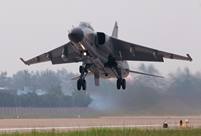

BEIJING, July 14 -- China was the main Oriental battlefield of the World Anti-Fascist War and the Chinese people had made great contributions to winning this war, said a renowned Chinese scholar.
Speaking at a press briefing held by the State Council Information Office here on Tuesday, Wang Jianlang, director of the Institute of Modern History under the Chinese Academy of Social Sciences, briefed the media about the latest research conclusions about the World War II.
He said China held back most of Japan's troops while coordinating with the Allies' fighting in the West. China also sent troops into Myanmar and other countries to help resist Japanese aggressors.
"Chinese people were not only defending their homeland, but also the security of other countries," said Wang.
He said that the Japanese army had deployed 1.86 million troops in China, accounting for more than 50 percent of a total of 3.58 million Japanese troops sent overseas.
Chinese forces killed, wounded and captured over 1.5 million Japanese troops in the war of resistance against Japanese aggression from 1931 to 1945.
He said China's perseverance had greatly impaired the power of Japanese aggressors, forcing them to give up northward invasion and slowing down their southward invasion.
"China's lasting resistance had won valuable time for other anti-Fascist countries, including the Soviet Union, the United States and Britain," said Wang.
He noted that during the Pacific War, China engaged the major part of the Japanese army. As a result, Japan was unable to dispatch more troops to the Pacific. This constituted a significant support to the Allied forces in the Pacific.
As a signatory on post-war declarations and involvement in the trials of war criminals, China actively participated in the building of the post-war order, he noted.
While answering questions on the reason China had chosen to release this data now, researcher Li Zhongjie said it was time to share a record of true history.
"We will let the facts speak for themselves. This move is not intended to instigate anything other than dialogue," Li said.
"Seventy years on, 'some forces' still refuse to acknowledge crimes during the Japanese invasion. They even feel reluctant to apologize," he said.
The commemoration of war is to stop it from reoccurring, added Wang.
During the war of resistance against Japanese aggression, China suffered a total of 35 million military and non-military casualties, accounting for a third of the total casualties of all the countries in the Second World War.
At the exchange rate of 1937, the official property losses suffered by the Chinese were valued at over 100 billion U.S. dollars. The indirect economic losses reached 500 billion dollars, according to data provided by the institute of modern history under the Chinese Academy of Social Sciences.
 Campus belle of Xiamen University gets popular online
Campus belle of Xiamen University gets popular online Who says moms cannot be trendy and hot?
Who says moms cannot be trendy and hot? Stunning photos of China's fighter planes
Stunning photos of China's fighter planes Humanoid robot Yang Yang appears in Shanghai
Humanoid robot Yang Yang appears in Shanghai Enteromorpha hits Qingdao coast
Enteromorpha hits Qingdao coast Eight fruits that defend men's health
Eight fruits that defend men's health  First batch of female combat pilots with duel degrees fly Flying Leopard
First batch of female combat pilots with duel degrees fly Flying Leopard Campus belle in HK goes viral online
Campus belle in HK goes viral online Top 10 secrets of longevity
Top 10 secrets of longevity US sings old tune over radical lawyers
US sings old tune over radical lawyers Taking a paws: 10 cuddly pics of sleeping animals
Taking a paws: 10 cuddly pics of sleeping animals  Villagers cash in on reincarnation interest, govt turns a blind eye
Villagers cash in on reincarnation interest, govt turns a blind eye  Wasteland: How China became the world’s garbage dump
Wasteland: How China became the world’s garbage dumpDay|Week